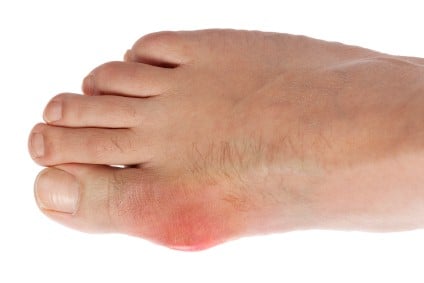What Are The Symptoms Associated With Gout?
Gout commonly develops after a number of years of build-up of uric acid crystals in the joints and surrounding tissues. If too much uric acid builds up in the fluid around the joints (synovial fluid), uric acid crystals will develop. Men who are between the ages of 40 and 50 are more prone to develop gout; women are more prone to develop gout after menopause. Gout also rarely affects children or young adults, although I was a young adult when I had my first gout attack.
The most common symptom of gout is sudden and severe pain in one or more joints; it may be swollen and you may also feel burning and stiffness in that area. typically your big toe, the most common joint involved, followed by the ankle or foot, the knee, the finger and only 10% of gout sufferers get an attack in the wrist or elbow but 11% get a gout attack in more than one part of the body at the same time and thank God for that. While the first attacks usually involve only one or two joints, multiple joints can be involved simultaneously over time. Other joints such as in the fingers, heels, and insteps could get affected too.
Gout flares usually strike abruptly, at night, and without any warning, although they can occur at any time. The pain is likely to be most severe within the first 12 to 24 hours after it begins and an attack can last anywhere between a few hours to 3 weeks. During the gout attack, the affected area becomes very tender and the skin becomes red or purplish and shiny.
Another symptom includes swelling in and around the affected area, the inflammation causing it to be very hot and very sensitive; even a slight touch makes it extremely painful. In some people, the acute pain is so intense that even a bed sheet on the toe causes severe pain. If gout is left untreated, it is more likely to affect more than one joint as it advances. Furthermore, 62% of gout sufferers experience a repeat attack within a year. As inflammation subsides in the affected joint, you may feel the skin be itchy and flaky causing it to peel.
By the time you have the symptoms of a gout attack, uric acid has been building up in your blood, and the uric acid deposits have been building on one or more of your joints. Also watch out after having an illness or surgery, the chances of an attack are higher. Some people may not experience gout as many painful attacks but rather develop chronic gout, repeated episodes of pain and inflammation, which may involve more than one joint.
What’s scary about gout is that some people who have it do not experience any symptoms in the beginning even though there are already elevated levels of uric acid in their body. They’ll only know it later on when the gout attack is already happening. These individuals do not require as serious treatment as those patients who have acute or chronic gout.
Patients with acute gout symptoms will typically experience severe pain within 12 to 24 hours of the attack. This pain can last for as long as a week or two. Chronic gout in older adults may be less painful and can be confused with other forms of arthritis. Those with chronic gout develop joint damage and loss of motion in the joints. Tophi are lumps below the skin around joints or in other places. They may drain chalky material.
Tophi usually develop only after a patient has had the disease for many years on the hands, elbows, ears or Achilles tendon (back of the ankle). In addition, later on gout sufferers are more prone to have kidney problems like kidney stones, that’s something you definitely want to avoid since it is extremely painful. Note that people with certain conditions like high blood pressure, diabetes and high cholesterol are at a higher risk of developing gout. To help manage your gout over the long term, it is important to keep your uric acid level below 6 mg/dL.
To avoid a gout attack, you need to avoid consuming certain food items that are high in purines. When you consume these, it will only elevate your uric acid causing you to have a higher chance of experiencing a gout attack. Here are the worst offenders that increase your risk:
- Beer
- Red meat
- Organ meats
- Shellfish
- Sugary beverages
- Desserts
You need to pay special attention to your diet making sure you are avoiding or limiting your consumption of these. In addition, there are certain factors to your current health that could increase your risk. If you have a family history of gout, are overweight or obese, diabetic, have metabolic syndrome, or have recently undergone surgery, you are at more risk for having gout.
Managing Your Gout Symptoms
Gout symptoms can be prevented by making lifestyle changes such as eating a low-purine diet, getting more exercise, drinking more water, and taking medication. The last point is important because this is what will greatly help you avoid those painful gout attacks.
There are two types of medication given to patients with gout. One is to treat a gout attack and another to reduce uric acid levels in the body. To treat a gout attack, you may be prescribed NSAIDs such as Advil, Naprosyn, or Motrin. Then there’s Colchicine which can minimize gout pain. For the inflammation caused by the gout attack, you will be given corticosteroids.
For long term use, your doctor will give you medications that can either block uric acid production or help your body to remove uric acid more efficiently. These medications have different side effects so you want to talk to your doctor first before you start taking them.
There are also natural remedies you can do at home to ease your gout symptoms. This includes tart cherries, ginger, apple cider vinegar, milk thistle seeds, magnesium, and celery. There are more remedies for gout out there but these are considered to be the top ones. Don’t be afraid to experiment with various remedies. As long as you do your research ahead and talk to your doctor about it first.
What has your experience been like during a gout attack? How do you cope with the symptoms? Share your stories in the comments below.

